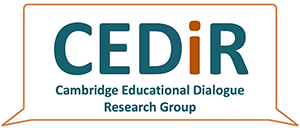About this research strand
This strand focuses on the interaction of dialogue for educational purposes and religious, cultural and philosophical traditions in educational theory, institutions and practices. Within this broad remit, it has two focal threads: intra-tradition and inter-tradition:
- The first explores processes of dialogue, broadly conceived, as they pertain to personhood and identity formation within a given tradition, including the relationships between individuals, their identifications, and a range of educational outcomes.
- The second explores dialogue between distinct cultural, philosophical and religious traditions – both as practiced in formal and informal educational contexts, and as the foundations for the development of educational theories. As part of this thread, the strand is the current home of the Cambridge Branch of the Philosophy of Education Society of Great Britain.
Strand Leader
The strand is convened by Dr Farah Ahmed (Leverhulme Early Career Research Fellow). Farah’s research interests lie in the intersections between educational dialogue, philosophies of Islamic education, 'Southern' theory, i.e. critical and indigenous research methodologies and personhood/character education. She is particularly interested in ontological, epistemological and theoretical frameworks and how these influence identity formation, classroom practice and teacher professional development.
Projects include
Rethinking Islamic education for British Muslim children.
Leverhulme Early Career Research Fellowship: 2020-2022, held by Dr Farah Ahmed.
This project is a philosophical investigation of dialogue in Islamic educational theory and an empirical study trialing dialogic pedagogy in UK madrasahs (supplementary schools).
As part of this Leverhulme Project, Farah Ahmed is collaborating with other researchers in a series of workshops called Cambridge Dialogues: Rethinking Islamic Education for the 21st Century.
The purposes of education in interfaith perspective
This symposium, supported by the Spalding Trust, and to be convened by Daniel Moulin-Stożek, is postponed until further notice.
Cambridge Philosophy of Education Seminars in partnership with the Philosophy of Education Society of Great Britain
Cambridge Philosophy of Education Seminars 2022
Tuesday 15th February 2022 5-6.30pm, via Zoom
Title: Reimagining African philosophy of education: On the cultivation of ubuntu
Over the past two decades African philosophy of education has been reconsidered in relation to the concept of ubuntu – literally human dignity and interdependence (Waghid, 2013). In this paper I argue that ubuntu is constituted by notions of autonomy, deliberative engagement, and responsibility. In this way cultivating and African philosophy of education cannot be delinked from actions that involve autonomy, deliberation, and responsibility. It is argued that an African philosophy guided by ubuntu has the potential to cultivate cosmopolitan actions intertwined with autonomy, deliberation and responsibility, that can undermine societal dystopias on the African continent and elsewhere.
Speaker: Professor Yusef Waghid, Stellenbosch University, South Africa
Yusef Waghid is distinguished professor of philosophy of (higher) education at Stellenbosch University in South Africa. He is the (co)author of African philosophy of education reconsidered: on being human (2013, Routledge); Rupturing African philosophy of teaching and learning: ubuntu justice and education (2018, Palgrave-MacMillan); The ubuntu university (2022, Palgrave-MacMillan); and Education, crises, and philosophy: ubuntu within higher education (Routledge, 2022).
Tuesday 22nd February 2022 2022 5-6.30pm, via Zoom
Title: Compassion as lived Mitleidenschaft
According to the Christian tradition, God reveals Himself especially in places where people are touched by the suffering of others and where compassion in the sense of “Mitleidenschaft” is lived. In German "Mit" means "with" and "leiden" = "to suffer". The word ending "schaft" comes after nouns in the German language when their totality is to be expressed. Numerous studies exist that examine the social component of suffering, while the religious dimension is left out. In this paper I explore how compassion may be instilled in students by sensitising them to the suffering of others. Working in the Christian tradition, I consider how compassion as lived Mitleidenschaft and religious commitment may be related and support one another.
Speaker: Maike Maria Domsel, University of Cologne, Germany
Maike Maria Domsel, is teacher of Catholic religious education and French at the Ernst-Moritz-Arndt-Gymnasium in Bonn, substitute professor for religious education at the University of Duisburg-Essen / lecturer at the University of Cologne. She studied Catholic theology and Roman studies in Bonn and received her doctorate in dogmatics from the Cologne University of Catholic Theology in 2019.
Tuesday 1st March 2022 5-6.30pm, via Zoom
Title: Children and COVID-19: Evidential and ethical biases
JCVI policy on vaccinating children, together with the slow roll out of vaccinations for children may have knock on effects on education. Widespread transmission among children, as well as uncertainty around the effects long-COVID, may be detrimental to children’s education, health and well-being. This presentation addresses the question: Shall we vaccinate children against COVID-19? Answering this question requires both the assessment of the relevant evidence as well as normative judgements about how to allocate scarce medical resources. I will argue that current debates display both evidential and ethical biases to the detriment of children. This evidential and ethical biases may be seen as symptoms of childism, or prejudice against children. I will conclude with a discussion of the wider societal and education implications of childism.
Speaker: Bengt Autzen, University College Cork, Ireland
Having studied mathematics as an undergraduate at Darmstadt University of Technology, Bengt completed a PhD in philosophy at the London School of Economics (LSE). Before joining UCC, Bengt did postdoctoral work in Bristol, Calgary, Munich and Salzburg. Bengt's research interests are in the philosophy of science, particularly the philosophy of biology, the philosophy of medicine and the philosophy of economics.
Tuesday 15th March 2022 5-6.30pm, via Zoom
Title: Teaching stories: "Teaching you your religion"
The title of my talk, “Teaching Stories”, points in several directions. It announces an inquiry into the role of stories as a method of teaching. It points towards stories that tell of teaching, and, maybe, it even relates stories that happened to teaching.
Our actual inquiry into the role of stories for teaching is narrower. It focuses on a particular area, the “teaching of religion”. It takes its hints specifically from two of the so-called “Religions of the Book”: Christianity and Islam, and its inspiration from the famous “Hadith of Gabriel”. In this way, what might have appeared at first as a purely linguistic issue, i.e., the relation of word to meaning, shows itself more and more in its pedagogical aspects. It, thereby, reaches the two questions situated in the center of our talk: why should teaching through stories be regarded as an excellent way of teaching religion? And to which extent do the concepts of 'religion' prevalent at a certain time, direct our discussion about religious education? After all, is it not possible that Islamic education and Christian education are not only two branches on the same tree, two subjects in school, but two trees?
Speaker: Professor Steffen Stelzer, American University in Cairo, Egypt
Steffen Stelzer is Emeritus Professor of Philosophy at the American University in Cairo and has been Chair of its Dept. of Philosophy. He received his PhD from the Freie Universität Berlin, has been a research scholar at the École Normale Supérieure in Paris in the 1970s, at Harvard University’s Near Eastern Languages and Civilizations Department, and taught at Johns Hopkins University.
His areas of specialization include comparative analyses of Western and Islamic concepts of knowledge and of the transmission of knowledge, Rationality and Revelation, and the ethical dimensions of Sufism. Due to his background in both Western philosophical learning and the dimensions of Eastern sapiental knowledge, he has published a variety of articles (on Islamic ethics, on Ibn ‘Arabi’s concept of spiritual travel, on Reason and Revelation, on the implication of Prophetic Authority for concepts of knowledge, and on the Sufic criticism of philosophy) which reflect, both in style and content, the influence of his ‘two studies’.
PESGB EVENTS ARE OPEN TO ALL STUDENTS AND STAFF
Our student representative this year is Adam Woodage (ajw305@cam.ac.uk)
Academic Year 2020-2021
Steiner Education
Yifan Sun, University of Cambridge
Tuesday 20 Oct 2020 5-6:30pm
Character Education in light of the Islamic concepts of Adab and Akhlaq
Abdullah Trevathan,
24th November 2020 5-6.30pm
Educational Justice: Liberal ideals, persistent inequality and the constructive uses of critique
Michael Merry, Department of Child Development and Education, University of Amsterdam,
Tuesday December 1st 2020, 5-6.30pm
A renewed philosophy of higher education for British Muslims Tim Winter, Shaykh Zayed Lecturer in Islamic Studies at the University of Cambridge, Tuesday Jan 26th 2021, 5-6.30pm
Alternative education in light of the Coronavirus crisis
Helen Lees, Independent scholar and writer, Tuesday April 27th 2021, 5-6.30pm
Technology and privacy in education
Shawn M. Bullock, Faculty of Education, University of Cambridge
Lent 2021, Date TBC
Moral formation
Kate Kirkpatrick, Fellow in Philosophy and Christian Ethics, University of Oxford, Tuesday 4 May 2021 5-6:30pm
All students and staff are welcome at these seminars.
PESGB Cambridge Branch Postgraduate Student Representative
Nomisha Kurian (nck28@cam.ac.uk)
Branch Secretary, Dr Daniel Moulin-Stożek (dpm50@cam.ac.uk)


